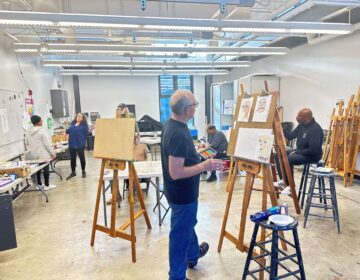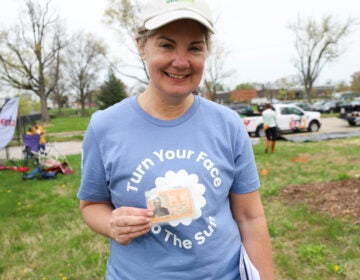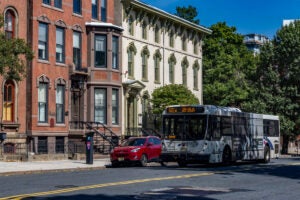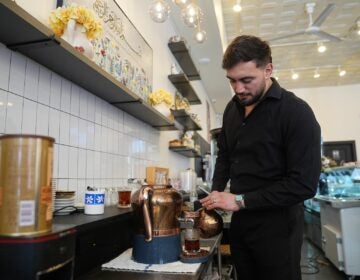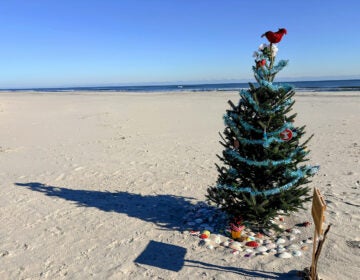Millville glassblowing studio looks to help veterans with PTSD and emotional trauma
Founded in partnership with Rowan University, the studio looks to help local veterans through building community and fostering creativity.
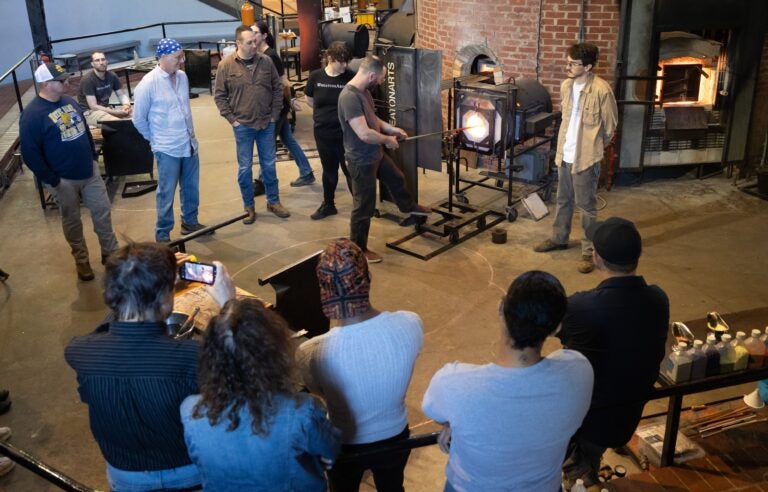
A class at WheatonArts in Millville, New Jersey, gets a lesson on the nuances of glass blowing. (Tim Hawk / Rowan University)
From Camden and Cherry Hill to Trenton and the Jersey Shore, what about life in New Jersey do you want WHYY News to cover? Let us know.
Once a month, a group of local military veterans gather around a furnace inside a glassblowing studio at WheatonArts in Millville, New Jersey, to create artistic objects.
The “Glass Art for Military Wellness” helps veterans and active-duty military members learn more than the “dance of glassblowing.” It helps them find healing through creativity and community, museum officials said. The program was created in partnership with Rowan University’s George Family Center for the Healing Arts. Participants said that the program has helped them process PTSD, depression and isolation.
“Stories emerged, shared experiences emerged and all of that helped them form a very strong sense of community with people that they may not have been in contact with had the class not happened,” said Pamela Annarilli Weichmann, director of education and artist services at WheatonArts.
The idea for the program was sparked by Operations Art of Valor and Veterans Glassblowing Day, a national movement launched in 2013 that encourages glass artists across the country to offer free classes to veterans. Inspired by these programs, WheatonArts and Rowan’s George Family Center decided to create a more sustained, localized version for the South Jersey community.
“Glassblowing has been long used as a method for healing,” Weichmann said. “With the partnership of Wheaton Arts and Rowan, and the funding from the Horizon Foundation, the stars aligned together.” Each piece of glass art created by the veterans will be part of a public exhibit scheduled to open Nov. 7 at Inspira Medical Center in Vineland. The timing is intentional, just ahead of Veterans Day, and the exhibit will include both finished works and statements from the artists about their experiences, museum officials said.
Samantha Gross, of Abescon, served in the National Guard Signal Unit, including 16 years in the Ready Reserve. Gross always wanted to work with glass and said the program gave her confidence while connecting her with others in the community.
“One of the other women in the classes has way more service years,” she said. “We exchanged phone numbers and hopefully will see each other again.”
The class also introduces participants to mental health support resources in a judgment-free way, officials said. Students learn about programs such as Healing Den in Vineland, the Army Air Field Museum in Millville, Veterans Farmers of New Jersey, Inspira Medical Center and the Veterans Multi-Service Center.
“These organizations have already committed to being available to our cohort members,” said Morgan Yacoe, director of Rowan University’s George Family Center for Healing Arts. “So even though we are working with art here, this is really about holistic wellness. We are building something much bigger than what’s happening in the studio.”
According to the U.S. Department of Veterans Affairs, about 7% of veterans will experience PTSD in their lifetimes. That number jumps significantly depending on service era — with up to 29% of Iraq and Afghanistan veterans impacted.
New Jersey has more than 299,000 veterans and state and local agencies have acknowledged the growing need for trauma-informed services. The VA reported that 370 veterans in the state died by suicide between 2014 and 2018. That rate was nearly seven points higher than New Jersey’s nonveteran suicide rate. Overall, the 2024 National Veteran Suicide Prevention annual report noted 41,484 American adults died by suicide in 2022, including 6,407 veterans in the U.S. and 56 in New Jersey. Earlier this year, the state Assembly cleared Bill 5307, which aims to expand funding for veteran suicide prevention.
The New Jersey Department of Military and Veterans Affairs offers the Readjustment Counseling Program, which provides free, confidential support to veterans and their families. The state also supports the Vet2Vet helpline, which pairs callers with trained peers who are also veterans. Yet despite these programs, many veterans fall through the cracks, officials said.
Jason Norton, of Hamilton, New Jersey, served with the 3rd Infantry at Fort Stewart, Georgia, and was deployed to Kosovo in 2000. He earned the Kosovo Campaign Medal and NATO Medal and is now part of the glassblowing program.
“The process is very rewarding, and I just got an introduction of the endless roads one can go down with exploring glass works and finding a new medium to express myself,” Norton said.
A recent clinical study found a 20% greater improvement in mental health symptoms among veterans who participated in art-based therapy compared to talk therapy alone.
Weichmann and Yacoe said they hope the exhibit will help raise awareness about the mental health challenges that veterans face and the importance of creative outlets in their healing process.
Given the success of the program, and requests by participants for additional classes, Weichmann and Yacoe said they are exploring ways to expand the program.
For veterans like Norton, the impact is already clear.
“A veteran’s mental health has gone through some real challenges, battles and continues to do so for the remainder of their lives. It is not something you can just turn off, but have to find ways to be aware of,” Norton said. “For myself, creating art and finding other ways such as exercise, going to the VFW, DAV and American Legion, helps with being able to talk and find support.”
Gross agreed.
“Most vets coming out of a long service have a harder time making connections with civilians as they are so used to a chain of command and a set of shared experiences,” Gross said. “Giving them a place to gather and connect without the stigma of a group meeting and counseling makes it way easier to relax and enjoy.”
If you or someone you know is a veteran in crisis, help is available. Call 988 and press 1 to reach the Veterans Crisis Line, or contact New Jersey’s Vet2Vet Peer Support Line at 866-838-7654.
WHYY News is partnering with independent journalists across New Jersey to spotlight the people, communities, cultures, and distinctive places that shape the Garden State. This work is made possible with support from the Geraldine R. Dodge Foundation.

Get daily updates from WHYY News!
WHYY is your source for fact-based, in-depth journalism and information. As a nonprofit organization, we rely on financial support from readers like you. Please give today.


